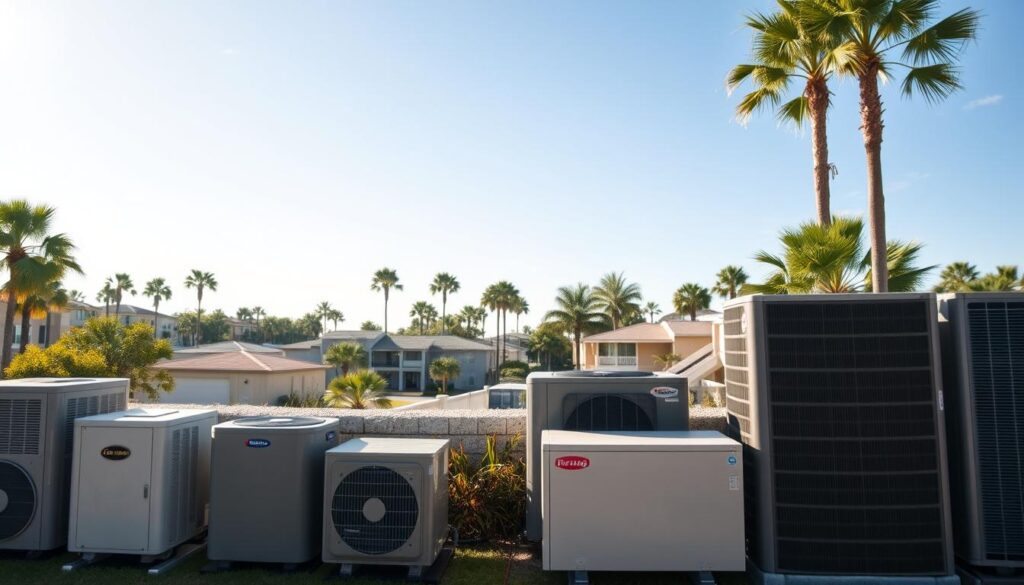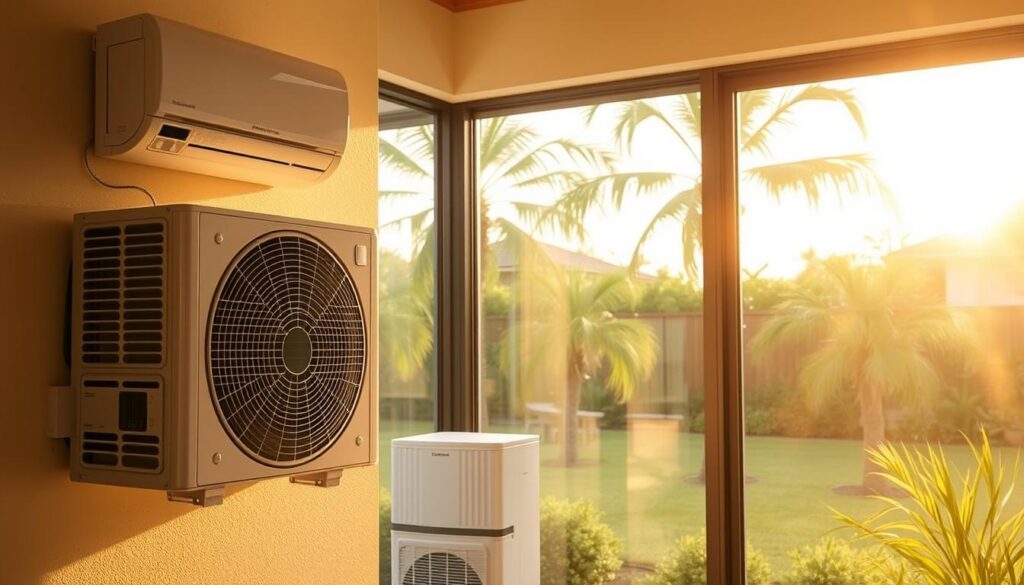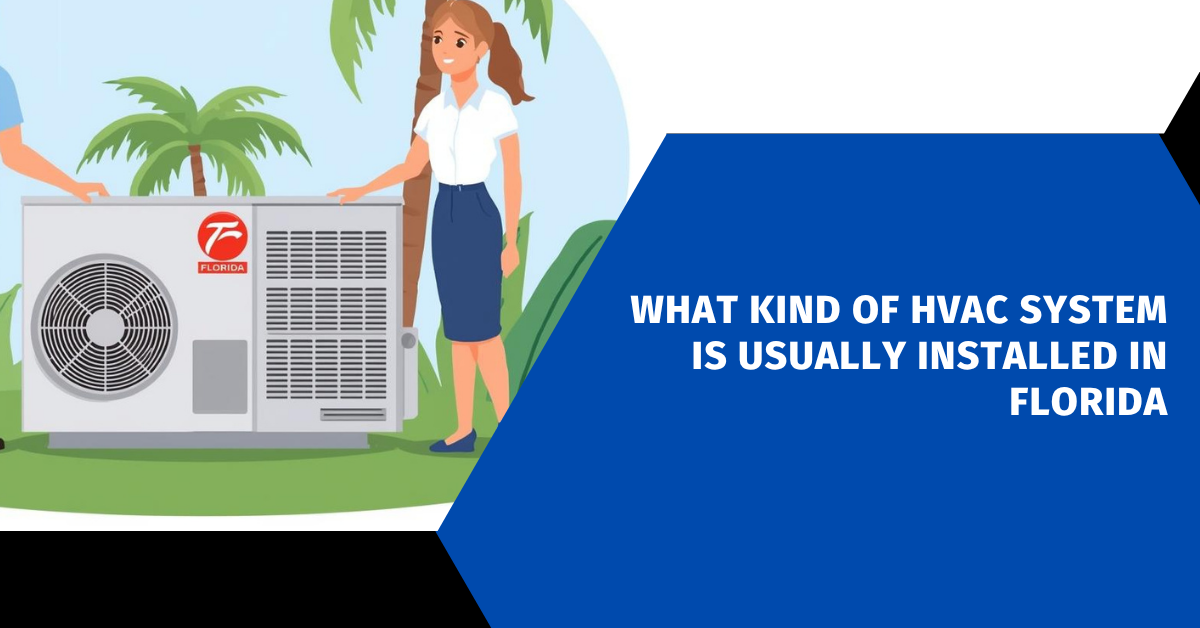Affiliate Disclosure
HVAC Guide Guys is a participant in the Amazon Services LLC Associates Program, an affiliate advertising program designed to provide a means for sites to earn advertising fees by advertising and linking to Amazon.
What Kind of HVAC System Is Usually Installed in Florida? Are you struggling to keep your Florida home cool without breaking the bank? Choosing the right HVAC system can be a game-changer in managing the state’s challenging climate conditions.

Florida’s extreme heat and humidity demand specialized cooling solutions. Central air conditioning in Florida homes is the most popular choice. Homeowners need robust systems that can handle temperatures consistently reaching the 90s while managing high moisture levels.
The unique subtropical environment requires more than just a standard cooling system. Your HVAC selection impacts energy efficiency, comfort, and long-term utility costs. Understanding the specific requirements of Florida’s climate is key for making an informed decision about your home’s cooling strategy.
Key Takeaways
- Central air conditioning dominates Florida’s residential HVAC landscape
- High humidity significantly influences system selection
- Energy efficiency is critical in Florida’s hot climate
- Proper HVAC system can reduce monthly utility expenses
- Climate-specific solutions outperform generic cooling approaches
Table of Contents
Understanding Florida’s Unique Climate and HVAC Requirements
Florida’s climate is unlike any other, posing big challenges for homeowners and HVAC experts. The state’s intense heat and high humidity need special HVAC solutions that can handle these harsh conditions.
Your HVAC system must meet several key needs specific to Florida’s climate:
- Extreme heat and humidity levels
- Consistent year-round warm temperatures
- High moisture content in the air
- Potential for severe weather events
Impact of High Humidity on HVAC Selection
Humidity is key for HVAC performance in Florida. Your cooling system must not just cool the air—it must also remove moisture. Standard air conditioning units often struggle, making it vital to follow florida building code hvac requirements for comfort.
Year-round Temperature Considerations
Florida’s climate is warm all year, unlike other places. Your HVAC system must work well all year. It should keep your home cool and comfortable, even in the hottest summer months.
Building Code Requirements for Florida HVAC Systems
Florida’s building codes have strict rules for HVAC installations. These rules help systems handle high humidity, salt air, and hurricanes. When picking an HVAC system, consider:
- Enhanced corrosion resistance
- Higher energy efficiency ratings
- Robust moisture control capabilities
- Wind and impact resistance for outdoor units
Knowing these climate challenges helps you choose the right HVAC system for your Florida home.
Explore Our HVAC Shop
Looking for top-rated HVAC tools, parts, and accessories? Visit our shop and find the perfect solution for your needs.
Visit the ShopCentral Air Conditioning Systems: The Florida Standard
In Florida, homeowners love central air conditioning. Split system air conditioners are the top choice for handling the state’s hot and humid weather. These systems control temperature and humidity perfectly, fitting Florida’s climate needs.
Central air conditioning systems have two main parts:
- An indoor air handler
- An outdoor condenser unit
Your central AC cools and dehumidifies air through ducts. This setup ensures consistent cooling in every room. Unlike other cooling methods, central air provides even temperature control efficiently.
Central air conditioning in Florida homes offers more than just cooling:
- It controls humidity well
- Improves indoor air quality
- Uses energy efficiently
- Operates quietly
Modern split system air conditioners come with cool features. They have programmable thermostats and high SEER ratings. These help you stay comfortable while saving on energy costs during hot summers.
Central air conditioning isn’t just a luxury in Florida—it’s an essential home comfort system.
Explore Our HVAC Shop
Looking for top-rated HVAC tools, parts, and accessories? Visit our shop and find the perfect solution for your needs.
Visit the ShopHeat Pump Systems: An Energy-Efficient Solution for Florida Homes
Florida homeowners are finding out how great heat pump systems are. These systems are super efficient and keep homes comfy, even with Florida’s weather.
Heat pumps are a new tech that cool and heat your home. They don’t make heat like old systems do. This makes them perfect for Florida’s mild winters.
Benefits of Heat Pumps in Mild Winters
In Florida’s mild winters, heat pumps shine by:
- Keeping your home at a comfy temperature
- Using less energy
- Not needing separate systems for heat and cool
Cost Savings and Performance Metrics
Heat pumps are top-notch for saving energy in Florida. The right one can cut your monthly bills a lot.
| SEER Rating | Energy Efficiency | Estimated Annual Savings |
|---|---|---|
| 14-16 SEER | Good | $200-$300 |
| 17-20 SEER | Excellent | $400-$600 |
| 21+ SEER | Superior | $600-$800 |
Installation Requirements and Considerations
Before getting a heat pump, think about these important things:
- How big your home is and its layout
- The local weather
- If your home’s ductwork fits
- How much you can spend upfront
Getting a pro to check your home is key to finding the best heat pump for you.
What Kind of HVAC System Is Usually Installed in Florida

Choosing the right cooling systems for humidity control in Florida is tough. The state’s hot and humid weather needs special HVAC solutions. These systems must handle the heat and moisture well.
Florida’s HVAC market is filled with a few main types:
- Central Air Conditioning Systems
- Heat Pump Systems
- Ductless Mini-Split Systems
Central air conditioning is the top choice in Florida. It cools whole homes and removes moisture, key in humid areas.
“In Florida, your HVAC system isn’t just about cooling—it’s about managing humidity and maintaining indoor comfort,” says local HVAC expert Mark Rodriguez.
Heat pumps are getting more popular for their energy savings and ability to heat and cool. They work great in Florida’s mild winters, keeping your home comfortable all year with less energy.
Ductless mini-split systems are perfect for smaller homes or unique layouts. They let you control the temperature in different areas. This makes them a favorite among Florida homeowners.
Finding the right HVAC system depends on your home’s size, budget, and cooling needs. Talking to a local HVAC expert can help you choose the best system for your home.
Explore Our HVAC Shop
Looking for top-rated HVAC tools, parts, and accessories? Visit our shop and find the perfect solution for your needs.
Visit the ShopDuctless Mini-Split Systems: Growing Popularity in Florida
Homeowners in Florida are choosing ductless mini-split systems for their energy efficiency. These systems are great for homes in the Sunshine State, even where installation is tough.
Ductless mini-split systems have big advantages over traditional HVAC. They are perfect for Florida’s warm weather.
Zoning Benefits for Florida Homes
Mini-split systems are great for zoning in Florida homes. You can control the temperature in each room. This makes your home more comfortable.
- Individual room temperature control
- No ductwork required
- Flexible installation options
- Reduced energy consumption
Energy Efficiency and Cost Analysis
Ductless mini-split systems are top for energy efficiency in hot weather. They are more efficient than central air conditioning.
| System Type | Energy Efficiency Rating | Average Annual Cost |
|---|---|---|
| Central AC | 14-16 SEER | $1,200-$1,800 |
| Ductless Mini-Split | 18-30 SEER | $800-$1,300 |
Getting a ductless mini-split system in Florida can save you money over time. They use less energy and cool better than traditional systems.
Packaged HVAC Units: All-in-One Solutions
Packaged HVAC units are a great choice for Florida homes. They are energy efficient and cool your home well. These units have both heating and cooling in one, perfect for small spaces.
Split system air conditioners are common in Florida. But, packaged units offer a more compact option. They have many benefits for homeowners:
- Simplified installation in tight spaces
- Reduced indoor equipment footprint
- Integrated heating and cooling capabilities
- Excellent performance in high-humidity environments
Florida’s weather is unique, and so are its HVAC needs. Packaged units are great for the state’s heat and humidity. They usually go on the roof or beside your home, saving space and cooling well.
Energy efficiency is key in Florida. Modern packaged HVAC units have high SEER ratings. This means they help save on cooling costs during the long summers. They use less energy than older systems.
Packaged units are a smart choice for Florida homeowners. They offer comfort and save on energy costs.
When picking a packaged HVAC unit, think about your home’s size and layout. Also, consider your cooling needs. A professional HVAC contractor can help find the best system for you.
Geothermal Heat Pumps: Sustainable Options for Florida Properties
Florida’s climate is perfect for exploring energy-saving HVAC options. Geothermal heat pumps use the earth’s steady underground temperatures. They provide top-notch cooling and heating.
Geothermal HVAC in Florida is a game-changer for home climate control. These systems tap into the earth’s stable temperatures. This creates an efficient way to cool and heat your home.
How Underground Loop Systems Work
Geothermal tech relies on underground loop systems. They move heat between your home and the ground. There are different types:
- Horizontal loop systems
- Vertical loop systems
- Pond/lake loop systems
- Open loop systems
Long-Term Benefits and Considerations
While they cost more upfront, geothermal heat pumps offer big perks:
- Less energy use
- Lower bills each month
- Less harm to the environment
- Longer system life
“Geothermal systems can reduce energy costs by 30-70% compared to traditional HVAC systems.” – U.S. Department of Energy
Investing in a geothermal heat pump saves money over time. It also cuts down on carbon emissions.
Explore Our HVAC Shop
Looking for top-rated HVAC tools, parts, and accessories? Visit our shop and find the perfect solution for your needs.
Visit the ShopEnergy Efficiency Considerations for Florida HVAC Systems

Choosing an energy-efficient HVAC in Florida is key. The state’s hot weather means you need a system that works well and saves on cooling costs.
High SEER rating systems are a smart choice for homeowners. They cool better and use less energy.
- Typical SEER ratings range from 13 to 21
- Higher SEER ratings mean lower electricity bills
- Modern systems can cut energy costs by up to 40%
When looking at energy-efficient HVAC, remember these important points:
| System Feature | Energy Savings |
|---|---|
| Variable-speed compressors | 25-30% energy reduction |
| Smart thermostats | 10-15% cooling cost savings |
| Proper system sizing | Up to 20% efficiency improvement |
Your HVAC’s efficiency isn’t just about its parts. Regular maintenance is also vital. Professional tune-ups keep your system running smoothly and prevent breakdowns in Florida’s heat.
Investing in a high-efficiency HVAC system is not an expense, but a long-term strategy for comfort and cost savings.
Conclusion
Choosing the right HVAC system for your Florida home is important. The state’s unique climate challenges need careful thought. You should consider humidity control, energy efficiency, and cooling performance.
Central air conditioning systems are the top choice in Florida. Heat pumps and ductless mini-split systems are also popular. The best systems for humidity control keep your home cool and dry during hot summers.
Think about the cost to install, energy savings, and your home’s design. HVAC experts can help match your needs and budget. They know what works best in Florida’s climate.
Looking for a system that’s efficient, affordable, and performs well is key. By exploring options and getting advice from local pros, you’ll find the best choice for your home.

